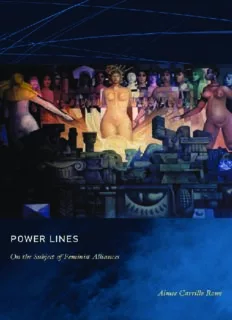
Power Lines: On the Subject of Feminist Alliances PDF
Preview Power Lines: On the Subject of Feminist Alliances
POWER LINES Aimee Carrillo Rowe POWER LINES On the Subject of Feminist Alliances DUKE UNIVERSITY PRESS DURHAM AND LONDON 2008 © 2008 DUKE UNIVERSITY PRESS All rights reserved Printed in the United States of America on acid-free paper $ Designed by C. H. Westmoreland Typeset in Carter & Cone Galliard by Keystone Typesetting, Inc. Library of Congress Cataloging-in- Publication Data appear on the last printed page of this book Duke University Press gratefully acknowledges the support of the University of Iowa, which provided funds towards the production of this book. TO MY MOTHER AND HER MOTHER —to all of those who have loved across power lines CONTENTS acknowledgments ix preface: Color in My Lines xi introduction: On the Subject of Feminist Alliances 1 1 Be Longing: Toward a Feminist Politics of Relation 25 2 Bridge Inscriptions: Toward a Methodology of Feminist Alliance 47 3 ‘‘Women’’ on the Inside: Whiteness, Heterosociality, and the Subject of Feminist Alliances 93 4 Zero-Sum Feminism: On the Interface between ‘‘Feminism’’ and ‘‘Alliances’’ 129 5 Power Lines: Toward a Feminism of Radical Belonging 179 epilogue: Pilgrimage 199 appendix a: Solicitation Letter 201 appendix b: Interview Questions 202 notes 205 works cited 227 index 243 ACKNOWLEDGMENTS This book is a living and breathing manifestation of transracial feminist alliances; it has emerged out of conversations and through the generous support of allies, whose faces intimate and humanize institutions. The early vision for Power Lines emerged during my doctoral work at the University of Washington under the wise and passionate mentorship of Susan Je√ords, Raka Shome, David Allen, Tani Barlow, Nancy Hart- sock, Saraswati Sunindyo, John Stewart, and Thomas K. Nakayama. The vision unfolded over the course of my tenure at the University of Iowa, where I received generous support from both my colleagues and the administration. I am deeply grateful to Daniel Gross for the pro- found insights that arose, and continue to arise, from his close reading of my manuscript and his and Carla Wilson’s deep connection to my life; to Claire Fox for her confidence in the project and her steady encourage- ment; to Naomi Grayser’s reassuring presence; to Mary Trachsel for her close reading; to Takis Poulakos, Vershawn Ashanti Young, and Bridget Tsemo for pushing me to be clear. I thank the members of poroi (David Depew, Thom Swiss, Barb Biesecker, John Nelson, Russell Val- entino) for inviting me to expand my theoretical horizons and to mem- bers of the Nonfiction Writing Program (Angela Balcita, Kerry Reilly, Heal, Eula Biss, Bryan Goedde, Angela Autry) for encouraging me to cultivate my writing voice. I am grateful for the generous support of the University of Iowa’s O≈ce of the Vice President for Research, Jay Semel and the Obermann Center for Advanced Studies Research Seminar Sti- pend, the Department of Rhetoric, poroi, and the College of Liberal Arts and Sciences. My community and my family are the breath that gives life to all that I create. In gratitude to my partner, Michaela Walsh, for her lyrical the- orizing and warm meals, and to my mother, Alicia Rowe, for continuing to grow with me. My long and deep alliance with Sheena Malhotra has provided the clearest manifestation of transracial feminist alliances that I know, as has the web of allies who’ve helped me to name what we do: Kimberlee Pérez, Cricket Keating, Rebecca Clark, Francesca Royster, Laila Farah, Vivien Ng, Lourdes Torres, Amira de la Garza, Tammy Ho, and Julia Johnson, with special thanks to Ann Russo, Mab Segrest, Aída
Description: